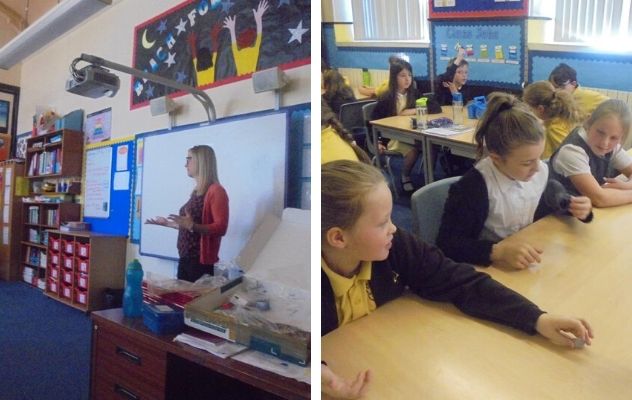
I work in marketing and sales strategy, and I freelance as a writer. Why, therefore, would I think I might be qualified as a STEM Ambassador?
It’s a question that I deliberated over for quite some time before I worked up the courage to stand in front of a room of 9 to 11-year-olds to talk to them about why STEM subjects are so important and why they should consider a career in an engineering business.
This was my reasoning:
1. Maths crops up in the most unexpected places
I use maths and statistics every day. To analyse our customer behaviour, our returns on marketing campaigns, our profitability, and to set and manage budgets.
2. Not every engineer is an expert in every field
I write content and blogs for engineering websites, translating technically complex concepts into messages that non-experts will understand. Even if a customer is an engineer, they won’t necessarily have the knowledge of a materials scientist, or specific expertise in sealing solutions. Added to that the fact that not all customers of engineering companies have a STEM background, finding the right balance to inform without overwhelming can be tricky.
3. Your country needs you… or words to that effect
My biggest motivation, though, is that I help to run an engineering business. We have a growth strategy and are slowly, but surely, succeeding. In the pursuit of growth, however, we have the unenviable task of attracting, recruiting and hiring from a small pool of very sought-after people. That pool needs to grow, and it needs to grow now – not just for us but for all those UK STEM-based companies doing amazing things with such limited resources.
Bored of hearing about the skills gap?
We’ve struggled to find engineers and toolmakers. We’re having trouble as we speak finding a business intelligence manager with the skills to analyse data to help us make smart decisions. We really do need more people to take up STEM subjects as a career path… and it would be nice if they were tinkering about with stuff as they went; we really, really value someone who has taken apart and reassembled something. Anything. An engine, a motor, a computer, a plug… not just looked at it in a CAD package, but really got stuck in and taken a hands-on approach.
We work in a world where we create real things, and many of them are unique; the more experience someone has in handling assemblies and components, seeing working parts in action, the more creative (and successful) they tend to be.
But I think anyone reading this blog probably already knows about the difficulties we face from the lack of STEM skills in the marketplace. In my view, we also have a secondary problem…
The struggle of recruiting people without STEM skills
“What do you mean?” I hear you cry. “Don’t we have enough problems already?” Well, yes, but it all stems (did you see what I did there?) from the same nub. There isn’t enough curiosity and excitement around STEM industries and subjects across the general population.
When I go out to find a marketing assistant, or an internal sales support or someone for our finance team, I have to do a PR job. Why? Because engineering isn’t sexy. Yes, yes, we all know it is, but they don’t. Well, not all of them.
Take marketing as an example.
- We sell to other businesses, not to the general public. So, Twitter, Facebook and other popular social media channels are used solely to support Page rankings. It’s not the exciting, cutting-edge world of consumer engagement and viral campaigns that many young marketers have their eye on.
- A clever hashtag or an amazing Instagram picture won’t work for us. We develop products and materials that people ‘need’ – and I say ‘need’ because they don’t know they need them. In the same way that civil engineers didn’t know they needed Tarmac until it was invented. We develop useful materials – and then we have to educate people. How many people went down to their local builders’ merchants asking if Tarmac had been developed yet? Similarly, people don’t trawl the internet looking for ‘nanomaterials in rubber for improved damping’ because they don’t know it’s an option yet.
This all means that when we recruit, we have to educate young people (older ones too, in fact!) about why engineering is such a brilliant industry to work in. If we talk to them about our work in F1 and Aerospace, that often does the trick - but those are just the obvious hooks, and it saddens me that there isn’t a better appreciation of what goes on behind the doors of the STEM-based private enterprises all around our innovative and industrious little island.
Ok, so not everyone in marketing has (or needs) a PhD in maths or physics, but a good grounding in maths, computing and a strong understanding of your chosen industry is important. Critical, even. As is curiosity and a love of how things work (including people’s minds); how things are made; what lies behind the search engine that we all love to loathe.
So why did I do it?
Why, in the end, did I sign up as a STEM Ambassador and stand in front of a load of pre-teens and talk to them about rubber engineering and marketing? Because those of us working in this business of making stuff - who understand what it’s like to be a part of this unending endeavour for improvement and progression - we can make things happen.
We can talk about and encourage until youngsters are able to see themselves in our shoes, and think that they might actually like to spend 35% of their waking hours as a working adult doing our jobs.
And so I went in with two simple goals:
- To stimulate interest in science and engineering subjects. Nothing more, nothing ground-breaking, just to make kids see that it’s a wonderful, exciting world where things change constantly and where people do stuff that really matters. Life-changing – lifesaving - work.
- To try to get the message across that it isn’t only mathematicians and scientists who use (and need) maths and science.
If you’d like to read about some of the things I talked about with the students, and some of their brilliant questions, you can read the blog post here.

